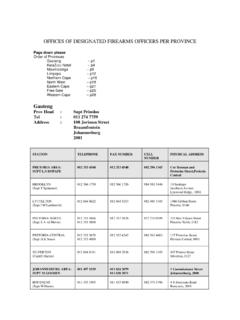Transcription of THE SUPREME COURT OF APPEAL OF SOUTH AFRICA …
1 SAFLII Note: Certain personal/private details of parties or witnesses have been redacted from this document in compliance with the law and SAFLII Policy THE SUPREME COURT OF APPEAL OF SOUTH AFRICA JUDGMENT Reportable Case No: 725/13 In the matter between: SPRING FOREST TRADING 599 CC APPELLANT and WILBERRY (PTY) LTD t/a ECOWASH FIRST RESPONDENT COMBINED MOTOR HOLDINGS LIMITED SECOND RESPONDENT t/a THE GREEN MACHINE Neutral citation: Spring Forest Trading v Wilberry (725/13) [2014] ZASCA 178 (21 November 2014) Coram: Lewis, Cachalia, Bosielo and Swain JJA and Mocumie AJA Heard: 10 November 2014 Delivered: 21 November 2014 Summary: Contract non-variation clause providing for cancellation to be in writing and signed by the parties whether cancellation by email valid Whether ss 13(1) and (3) of the Electronic Communications and 2 Transactions Act 25 of 2002 applies Whether interim interdict pendente lite appealable.
2 _____ ORDER _____ On APPEAL from: kwazulu - natal Local Division, Durban (Madondo J sitting as COURT of first instance): The APPEAL is upheld with costs. The order of the high COURT is set aside and in its place the following is substituted: The application is dismissed with costs. _____ JUDGMENT _____ Cachalia JA (Lewis, Bosielo and Swain JJA and Mocumie AJA concurring) [1] This is an APPEAL from a decision of the high COURT , kwazulu - natal , Durban (Madondo J) granting interim relief pendente lite. The order was granted following an urgent application by Wilberry (Pty) Ltd t/a as Ecowash against Spring Forest Trading 599 CC and Combined Motor Holdings Limited t/a The Green Machine (CMH). CMH is cited because it has an interest in the relief claimed, but is not party to this APPEAL . So the protagonists in this APPEAL are Spring Forest Trading 599 CC and Wilberry (Pty) Ltd t/a Ecowash.
3 They shall be referred to as the appellant and respondent respectively. 3 [2] The APPEAL concerns a series of emails purporting to consensually cancel written agreements between the parties. The agreements required any consensual cancellation to be in writing and signed by them. The Electronic Communications and Transactions Act 25 of 2002 (the Act) gives legal recognition to transactions concluded electronically by email. The dispute between the parties requires us to consider whether their exchange of emails met the writing and signature requirements of the Act thereby constituting a consensual cancellation. [3] The learned judge found that the e-mail communications as a fact did not evince an intention to cancel the agreements, but merely recorded the inconclusive negotiations between the parties to that end. And, that in any event, the parties had not specified that their agreements could be cancelled by the exchange of emails.
4 He thus held that the Act did not apply to the emails and that the appellant s purported cancellation of the agreements was in conflict with the terms of their written agreements, and therefore invalid. This APPEAL is with his leave. [4] The facts are uncomplicated. The respondent is the proprietor of an Eco-Wash System operated from one of its Mobile Dispensing Units (MDU s). The business involves washing cars in the parking lots of shopping malls, office parks, hotels and hospitals. The parties concluded a written agreement (the master agreement) on 28 April 2012 in terms of which the respondent appointed the appellant as its operating agent. This gave the appellant the right to promote, operate and rent out the respondent s MDU s to third parties. The agreement contained a non-variation clause providing that no variation or consensual cancellation would be effective unless reduced to writing and signed by both parties.
5 [5] On 20 June and 23 July 2012 the parties concluded four subsidiary rental agreements all of which were subject to the respondent s standard terms of business as set out in the master agreement. The rental agreements permitted the appellants to lease the respondent s MDU s at four locations. They also contained non-variation 4 clauses providing that no variation .. or agreement to cancel shall be of any force and effect unless in writing and signed by both you and us . [6] The appellant was not able to meet its rental commitments under the rental agreements on 1 February 2013. The parties then met in Durban on the morning of 25 February 2013 to discuss how they should proceed in light of the appellant s failure to meet its rental obligations. The respondent was represented at the meeting by Mr Nigel Keirby-Smith and the appellant by Mr Gregory Stuart Hamilton and Mr Walter Burger. Keirby-Smith put four proposals to the appellant s representatives.
6 They undertook to consider these and respond after the meeting. [7] Hamilton dispatched an email to Keirby-Smith later that morning at 11h44 am confirming the proposals. It read: Hi Nigel, Thanks for meeting with Walter and I today. I would like to clarify the options that you mentioned to us today. 1/ Pay a cash amount of R1 600 for the balance of 2 years. 2/ Cancel agreement and walk away. 3/ Carry on operating but we would end up in COURT . 4/ Pay R1 per month for 5 years with 15 % escalation. Please confirm the above then we will advise tomorrow. Kind Regards Greg. At 11h56 am, Hamilton sent a further email to Keirby-Smith: Hi Nigel, [Fu]rther to my previous mail, to clarify point 2. Please confirm that should we elect this option to walk away, there [wi]ll be no further claim or legal action from either side. 5 Kind Regards Greg. At 12h18 pm, Keirby-Smith replied: Hi Greg, That is correct subject to my last reply.
7 Nigel. The last reply referred to in the email above was sent from Keirby-Smith s address (..) at 12h05 pm. It read: All arrear rentals due at the date of handover will be due. Henry Wilkinson Chief Executive Officer. At 04h02 pm, Hamilton sent the final email in this exchange: Dear Henry and Nigel, [A]s per our discussion this morning and follow up emails, we thank you for the 4 options offered to us. We confirm that we accept your second offer whereby we will return all equipment leased to us and that there shall be no further legal recourse from either party. We would like all equipment picked up on or before 28 February 2013 so that we do not incur further lease costs for the following month. Kind Regards Greg. [8] On 13 March 2013, the appellant paid the arrear rentals. However, it continued operating its car washing business at the locations covered by the rental agreements.
8 It says it was entitled to do this as both the master and rental agreements between it and the respondent had been cancelled. And following the cancellation it entered into an agreement with another entity CMH to use its mobile cleaning devices at the locations from which it had been operating. 6 [9] The respondent denies that the agreements were validly cancelled. It therefore sought and was granted interdictory relief to protect its proprietary rights in its MDU s pending the institution of an action for breach of the agreements. [10] The appellant s case is this. The respondent offered four options to the appellant at the meeting on 25 February 2013. The appellant accepted the second option that it could cancel the agreements and walk away in writing by email. The parties agreed further in the series of emails that once the appellant had paid the arrear rental, which it did on 13 March 2013, and the respondent s equipment had been returned, which was also done, there had been a consensual cancellation of the agreement.
9 The cancellation meets with the requirements for the information to be recorded in writing and signed by the parties in terms of s 13(3) of the Act. [11] The respondent disputes the appellant s argument. It contends that the email exchange was merely a negotiation between the parties regarding the appellant s breaches and did not amount to a consensual cancellation of the agreements, a contention that the high COURT upheld. At best for the appellant, says the respondent, the emails refer only to the rental agreements, not the master agreement. However, if they do evince a cancellation of both the master and the rental agreements, the emails did not comply with s 13(1) of the Act. This is because the section requires an advanced electronic signature to be used on an email when a signature is required by law as specified by the non-variation clause in this case and no such signature appears on the emails.
10 In addition, s 13(3), relied upon by the appellant to bring the emails within the ambit of the Act, does not apply for reasons given later in this [12] The respondent s contention that the emails merely record a negotiation and do not amount to an agreement to cancel is utterly without merit. The emails say emphatically and unambiguously that once the appellant settles the arrear rental and 1 Sections 13(1) and (3) are set out below para [17]. 7 returns the respondent s equipment it may walk away without any further legal obligation. This can only mean and did mean that the parties considered that all agreements between them (the master and subsidiary rental agreements) would be cancelled once the appellant had satisfied two obligations: payment of the arrear rental and return of equipment. The obligations were met and the agreements therefore do evince a consensual cancellation.













